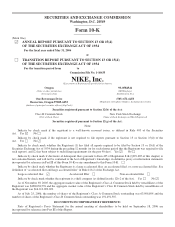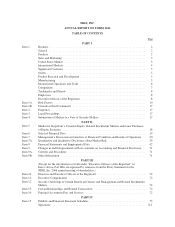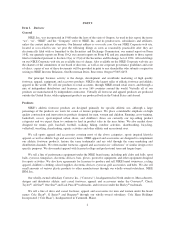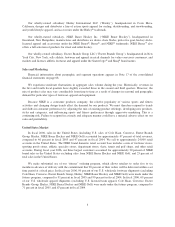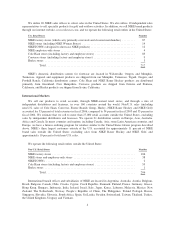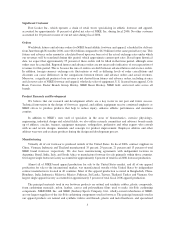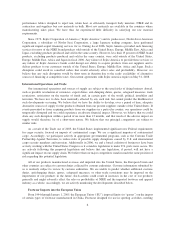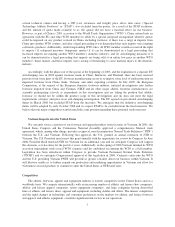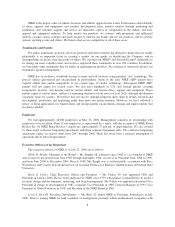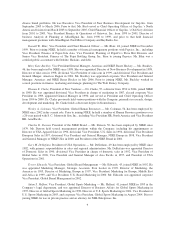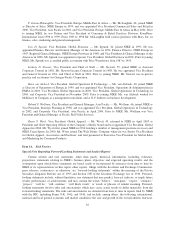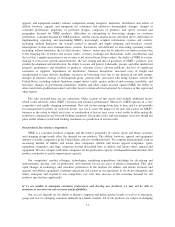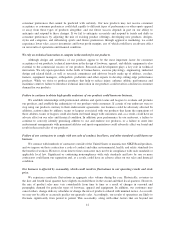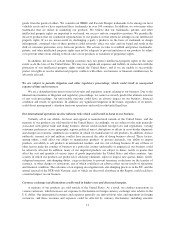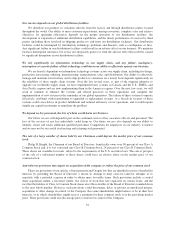Nike 2006 Annual Report Download - page 7
Download and view the complete annual report
Please find page 7 of the 2006 Nike annual report below. You can navigate through the pages in the report by either clicking on the pages listed below, or by using the keyword search tool below to find specific information within the annual report.performance fabrics designed to repel rain, retain heat, or efficiently transport body moisture. NIKE and its
contractors and suppliers buy raw materials in bulk. Most raw materials are available in the countries where
manufacturing takes place. We have thus far experienced little difficulty in satisfying our raw material
requirements.
Since 1972, Sojitz Corporation of America (“Sojitz America”) and its predecessor, Nissho Iwai American
Corporation, a subsidiary of Nissho Iwai Corporation, a large Japanese trading company, have performed
significant import-export financing services for us. During fiscal 2006, Sojitz America provided such financing
services for most of the NIKE brand products sold outside of the United States, Europe, Middle East, Africa and
Japan, excluding products produced and sold in the same country. However, less than 13 percent of NIKE brand
products, excluding products produced and sold in the same country, were sold outside of the United States,
Europe, Middle East, Africa and Japan in fiscal 2006. Any failure of Sojitz America to provide these services or
any failure of Sojitz America’s banks could disrupt our ability to acquire products from our suppliers and to
deliver products to our customers outside of the United States, Europe, Middle East, Africa and Japan. Such a
disruption could result in cancelled orders that would adversely affect sales and profitability. However, we
believe that any such disruption would be short term in duration due to the ready availability of alternative
sources of financing at competitive rates. Our current agreements with Sojitz America expire on May 31, 2008.
International Operations and Trade
Our international operations and sources of supply are subject to the usual risks of doing business abroad,
such as possible revaluation of currencies, export duties, anti-dumping duties, quotas, safeguard measures, trade
restrictions, restrictions on the transfer of funds and, in certain parts of the world, political instability and
terrorism. We have not, to date, been materially affected by any such risk, but cannot predict the likelihood of
such developments occurring. We believe that we have the ability to develop, over a period of time, adequate
alternative sources of supply for the products obtained from our present suppliers outside of the United States. If
events prevented us from acquiring products from our suppliers in a particular country, our operations could be
temporarily disrupted and we could experience an adverse financial impact. However, we believe that we could
abate any such disruption within a period of no more than 12 months, and that much of the adverse impact on
supply would, therefore, be of a short-term nature. We believe that our principal competitors are subject to
similar risks.
As a result of the Trade Act of 2003, the United States implemented significant new Federal requirements
for cargo security, focused on imports of containerized cargo. We are a significant importer of containerized
cargo. Accordingly, we participate actively in appropriate governmental programs, such as the Customs Trade
Partnership Against Terrorism, to reduce risks of possible supply disruptions caused by U.S. and international
cargo security mandates and terrorism. Additionally in 2006, we and a broad coalition of businesses have been
actively working with the United States Congress as it considers legislation to make U.S. ports more secure. We
are actively following this proposed legislation and believe that any legislation, if passed, will not have a
significant impact on our supply chain. We believe that our major competitors stand in much the same position of
risk regarding this potential legislation.
All of our products manufactured overseas and imported into the United States, the European Union and
other countries are subject to customs duties collected by customs authorities. Customs information submitted by
us is routinely subject to review by customs authorities. We are unable to predict whether additional customs
duties, anti-dumping duties, quotas, safeguard measures, or other trade restrictions may be imposed on the
importation of our products in the future. Such actions could result in increases in the cost of our products
generally and might adversely affect the sales or profitability of NIKE and the imported footwear and apparel
industry as a whole. Accordingly, we are actively monitoring the developments described below.
Footwear Imports into the European Union
From 1994 through January 1, 2005, the European Union (“EU”) imposed limits (or “quotas”) on the import
of certain types of footwear manufactured in China. Footwear designed for use in sporting activities, meeting
6

